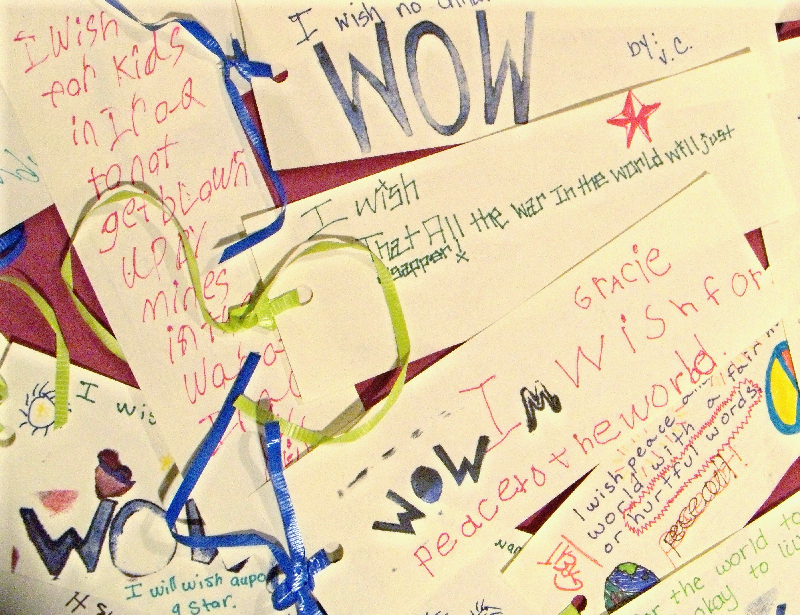By Kathy Short, Director of Worlds of Words
 Many adults believe children should not be burdened with books that raise difficult social issues, particularly war and violence. They argue to protect the innocence of children, not realizing that what children want is perspective, not protection.
Many adults believe children should not be burdened with books that raise difficult social issues, particularly war and violence. They argue to protect the innocence of children, not realizing that what children want is perspective, not protection.
As we sorted through children’s wishes for the world, wishes about war and peace were the most prevalent. Their comments ranged from general wishes, such as “I wish for peace to the world” and “ I wish that all the war in the world would just disappear” to more specific wishes, such as “I wish no children be in a war zone” and “I wish for kids in Iraq to not get blown up by mines in the war.” Children know what occurs around them in the world. Our attempts to protect them reflect adults’ naïve views of childhood rather than children’s need to gain perspective on these difficult events.
Hope is a strength that children bring to difficult life issues. They are not ready to give up, but instead wish for a better and more peaceful world and are willing to act on that hope. Michael Foreman (2009), a British author and illustrator, has created A Child’s Garden: A Story of Hope, a picture book that metaphorically reflects a child’s hope for healing and renewal. A boy nurtures a small green sprout in the midst of rubble until it becomes a large flowering vine that covers the barbed wire fence that contains people in ruins. The garden becomes a playground for children, but is destroyed by soldiers on the other side. The boy despairs until he sees a girl on the other side of the fence begin to nurture a new green shoot and his hope grows along with the new plant.
When I Grow Up, I Will Win the Nobel Peace Prize by Isabel Pin (2006) is a picture book translated from German that uses humor and irony to contrast action and thought. The book follows a young child who constantly expresses his many wishes for peace in the world, while behaving otherwise in his daily life. The book captures the grandness of wishes against the struggle for peace in the small everyday episodes of life. Wishes may be a place to start but they do not replace the struggle to take action in daily life.
I am curious about books you have read with children that reflect hope for the world, particularly related to war and peace. What books have you read that moved you because of the message of hope in the midst of despair? How did children respond?
Journey through Worlds of Words during our open reading hours: Monday through Friday 9 a.m. to 5 p.m. and Saturday 9 a.m. to 1 p.m. Check out our two online journals, WOW Review and WOW Stories, and keep up with WOW’s news and events.
- Themes: Kathy Short
- Descriptors: Books & Resources, Debates & Trends, Student Connections, WOW Currents

The book of poems This Place I Know: Poems of Comfort by Georgia Heard and others was one we read a lot after 9/11.
I just shared THE ENEMY: A BOOK ABOUT PEACE by
Cali & Bloch. Even though it is a simple
picture book it ignited a thoughtful
discussion about the issues of war and peace.
I enjoy reading “The Librarian of Basra: A True Story from Iraq” by Jeanette Winters. I haven’t used it with children, but when I use it in my Children’s Literature classes it always provokes discussion. Some students aren’t sure if it’s ok to feel sympathy for an Iraqi librarian; others have difficulty supporting the war in Iraq but also mourning the destruction caused by war. Lots of good talk.
On their Shaun Tan Author-Illustrator Study wiki, Tanque Verde High School students (library student aides) discussed whether or not children should be sheltered from the harsher realities of life. Overall, they concurred that it is important for children to experience the harsher realities of life through books. You can access their discussion at: http://shauntan.wikispaces.com/message/view/home/11489683
Silent Music by James Rumford always soothes my own emotions and upon discussing it with others, I often find the same response. It shows that a peaceful hope resides in the arts. I thought of the same thing during a recent interview with Jerry Pinkney around his upcoming book with Marilyn Nelson, Sweethearts of Rhythm. He talked about dance and music helping to create resilient people on the homefront during a time of war and all the effects it entails (WWII). I’ve used these more in education classes but will be using them with children this year.